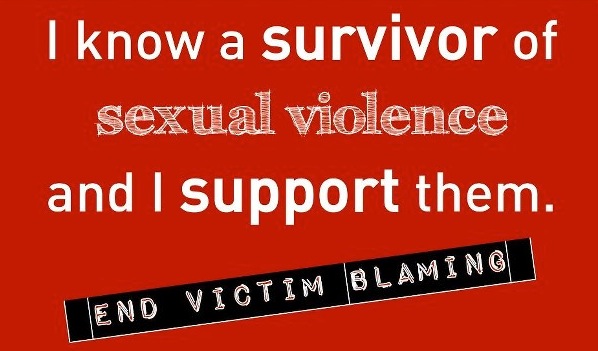Call it what you wish — Sexual Assault Awareness, or Sexual Assault Awareness and Action Month. Either way, we’re in it and, before April comes to a close, I thought I would share five action points.
1) This week, validate a survivor.
Maybe you didn’t mean to, but the words just slipped out. Maybe at the time you didn’t understand what you do now. Either way, it’s not too late. This week, validate the experiences of someone in your life who has been sexually assaulted. If it’s appropriate, let them know that they are believed and they were not to blame. If not, honour them silently and hold onto those thoughts for them.
Alternatively, make a vow that if or when someone shares with you their experience of sexual assault, you will suspend judgement and listen empathetically without blame or doubt.
Validating survivors’ experiences as sexual assault — that is: that what happened to them was unquestionably wrong, illegal, and not their fault — increases the chances that they will treat themselves accordingly and seek formal and informal help rather than internalizing anger, guilt, shame and confusion. Maybe that survivor is you. Take some time this week to validate your experience and ask how you can help yourself heal.
2) This week, acknowledge victim blaming.
Sexual assault can be scary to even think about. Sometimes when we need to distance ourselves from an unsettling fact, we will do almost anything to convince ourselves that it couldn’t happen to us (because we’re too smart and cautious) or people we love or respect (because they’re too smart and cautious). This keeps the thought of victims (who must not have been as smart or cautious, otherwise that bad thing wouldn’t have happened to them) and their experiences at a safe distance.
No one means to victim-blame, but this is such a common way of thinking and talking about sexual assault that victim blaming often happens without our acknowledgement. Progress happens when we shift responsibility for sexual assault onto the perpetrator.
3) This week, banish a rape script.
Think you know what is and isn’t sexual assault? You might be relying on a rape script. Rape scripts are the narrow, stereotyped scenarios that inform our ideas of what is supposed to be a “typical” incidence of sexual assault. Rape scripts can cause us to doubt the legitimacy of an alleged sexual assault based on how far the accuser’s story deviates from the “norm.” Multiple studies have shown that mock juries and actual police officers and judges will more likely perceive a complainant to be lying the further the complainant’s account diverges from set ideas of what is a conventionally believable sexual assault story.
For starters, this is bad news for men and boys who may or may not come forward about being assaulted, especially by women, because their account will not agree with the stereotyped ideas of a typical victim and a typical perpetrator. Allowing space for multiple stories of sexual assault is important in order for our culture to be more helpful towards sexual assault survivors, and better at directing culpability towards perpetrators.
4) This week, get comfortable with consent and the Canadian Criminal Code.
Did you know that Canada’s criminal code definition of sexual assault is based upon the presence or absence of consent, and it outlines where and when consent can and cannot be given? It states that it is sexual assault where there is “a lack of agreement to the sexual activity in question.” It states that a complainant cannot give consent when intoxicated nor have someone else give consent for them, or consent where a position of trust, power or authority was abused by the accused. It states that everyone has the right to, by words or conduct, change their mind about what sexual acts they continue.
This is important because it gives us a working definition of sexual assault as opposed to relying on tiresome adages of “it takes two to tango” and “it was grey rape.” The code places full responsibility on sexual partners to obtain clear agreement to sexual acts before they happen.
Some guidelines on consent:
-Don’t assume carte blanche because someone is in bed with you! We all have sexual boundaries and it’s best not to discover your partners’ by overstepping them.
-When in doubt, ask. It’s your responsibility to make sure you have willing consent from your partners for every act, and not your partners’ responsibility to proactively read your mind in case you’re planning on doing something you’re not sure they will be into.
-Consent is hot. Think that asking first will kill the mood? Wrongo. It’s always hot to talk about sex, to say what you want to do, and to make sure you’re not committing sexual assault.
5) This week, seek complexity.
Sexual assault is a complex and totally puzzling topic. The more I research, the less I feel I know. What I do know is that there are no easy or simple answers; there is no one true explanation, cause or cure.
But what we can do as individuals and communities to reduce the incidence and harm of sexual assault depends upon our understanding of the issue. Build your understanding this week, and any week you can. Seek complexity. Seek to educate yourself and don’t be afraid to gently educate others. Ask questions, and question your assumptions that come from your background and experiences. Sometimes the most important part of learning is the unlearning.
Clay Nikiforuk is a recent Creative Writing graduate from UBC and lives in Montreal. She is currently writing her first book exploring and critiquing the sociology of sexual assault. When not reading, writing or getting into vehement debates with strangers, she is dancing, taking pictures, and an avid potluck-attendee. To help fund her book you can go to http://www.gofundme.com/jenniesbook.



